Immune Modulation Effects of Chinese Herbs
Modern research shows that individuals suffering from deficient disharmonies have various degrees of under-functioning or disturbances of their immune systems.(2) Correspondingly, many tonification herbs applied to these conditions can enhance immune functions. For example, herbs like reishi mushroom, ginseng, pilose asiabell root, astragalus root, largehead artactylodes rhizome, hairy deerhorn and Chinese caterpillar fungus, angelica root and wolfberry fruit enhance the engulfing activities of monocytes, activate T-lymph cells and NK cells, enhance antibody productions and induce interferon (a protein effective against some viruses) reactions.(2) Tonifying herbs that are blood builders like wolfberry fruit, fleeceflower root, donkey hide glue, mulberry fruit, rehmannia root, angelica root, glossy privet fruit and hairy deerhorn enhance blood cell production in the bone marrow (immune organ) significantly. They can be used as adjuvant therapy in leucopenia (low level of white blood cells) conditions caused by radio or chemotherapies, or some autoimmune blood diseases.(2)
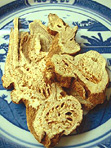 Largehead artactylodes rhizome (bai zhu) enhances the engulfing activities of monocytes and activates T-lymph cells. |
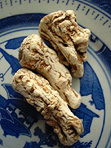 Angelica root (dang gui) activate the NK cells and promotes antibody productions. |
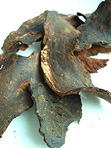 Fleeceflower root (he shou gui) enhances blood cell production in the bone marrow. |
In the herbal category for fire or heat clearing, many herbs can promote immune functions and body resistance. They also inhibit certain adverse immune reactions that are harmful to the body. For example, herbs like baical skullcap root, honeysuckle flower, sweet wormwood herb and snakegourd root inhibit hypersensitivity reactions significantly.(2) Some of them also induce the production of interferon, or inhibit the production of tumor necrosis factor.(2) Enhancement of the pituitary- adrenal cortex can also be done with this category of herbs such as spreading hedyotis, figwort root, andrographis (chuan xin lian) and Chinese ash bark.
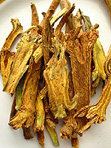 Baical skullcap root (huang qin) inhibits hypersensitivity reactions significantly. |
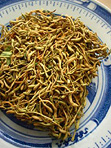 Honeysuckle flower (jin yin hua) induces the production of interferon. |
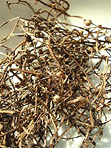 Spreading hydyotis (bai hua she she cao) enhances the functions of the pituitary- adrenal cortex. |
In the herbal category for activating blood and resolving blood problems, the herbs not only benefit for improving the cardiovascular system and blood flowing, some also possess important effects on immune regulation. Herbs like notoginseng, cyathula root, red sage root, Szechuan lovage, peach kernel and Chinese mugwort leaf can affect the blood clotting mechanism, they also increase T-lymph cell proliferation and promote specific antibody productions.(2) Some other herbs like notoginseng and Indian madder root promote blood cell production in the bone marrow too.(2)
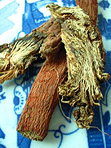 Red sage root increases T-lymph cell proliferation. |
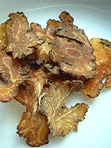 Szechuan lovage promotes specific antibody production. |
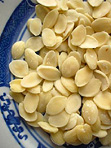 Peach kernel is commonly used for blood and circulation problems in TCM. |
In the herbal category for expelling wind and relieving exterior, the herbs are mainly used for induce perspiration, relieve muscles and promote eruption, they can affect the physical immune barriers of the body, such as the skin, respiratory mucosa, or localized immune functions. For example, some of them enhance the engulfing actions of phagocytes, like ledebouriella root, cassia twig, cassia twig, perilla leaf, dried ginger and bupleurum root for anti-infection or inhibiting allergic reactions.(2) Some of the herbs also act directly on the immune organs.
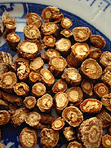 Ledebouriella root enhances the engulfing actions of phagocytes. |
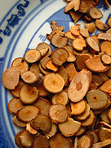 Cassia twig is commonly used for cold and flu in TCM. |
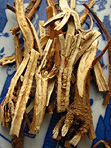 Bupleurum root is commonly used for relieving fever in TCM. |
It is well known that Chinese herbs used for joint problems possess significant immune inhibiting effects, including Caulis Sinomenii (qing feng teng), common threewingnut root and fourstamen stephania root. Other herbs that inhibit multiple hypersensitivity reactions are paniculated swallow-wort root, acanthopanax bark and large-leaf gentian root.(2)
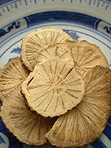 Fourstamen stephania root has immune inhibiting effects. |
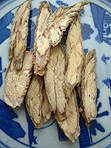 Acanthopanax bark inhibits multiple hypersensitivity reactions |
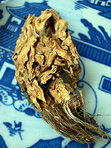 Large-leaf geatian root is commonly used for joint problems in TCM. |
Chinese herbs with anti-cancer effects can inhibit or kill cancer cells, sample herbs are natural indigo, java brucea fruit, sweet melon pedicel and Chinese fir.(2) Some of these herbs even boost the overall immune functions, such as toad venom, java brucea fruit, large blister beetle, natural indigo and sweet melon pedicel.(2) Also, some common food ingredients like garlic can also help reduce carcinogenic factors.
Most Chinese medicines remain in their natural forms and activities for clinically use. They have testified and verified for thousand years by Chinese medicine practitioners, those left behind have proven their efficacies. Scientists have noted their characters such as multiple effectiveness, dual modulation and adaptive capabilities. However, even in the study of immune modulation, projects for Chinese medicines are huge and complex, and the current research has not been working systematic. Among those single herbs or formulas, it is necessary to carry out more in depth investigations for further explanation about the mechanism of how these herbal ingredients work.
References
- He Huai-xin & Xi Xiao-xian, TCM Immunology, Beijing: Publishing House of People's Military Hospital, May 2000.
- Luo He-sheng, Luo Ding-hui & others, TCM Immunology: Chinese Medicine Pharmacology and Clinical Practice, Beijing: Joint Publishing House of Beijing Medical College and Beijing Union Medical College, April 1999.
- Yu chuan-lin, Ye Tian-xing & others, Modern Medical Immunology, Publishing House of Shanghai Medical University, October 1998.
- Kou Hua-sheng & Lin Jian-yu, TCM Immunology, Wuhan: Hubei Publishing House of Science and Technology, June 1990.
Written By
Wang Li Professor, Beijing University of Chinese MedicineEditors
Angela Collingwood, MSN, Integrated Chinese Medicine Holdings Ltd. Lawrence Lau, Ph.D., Integrated Chinese Medicine Holdings Ltd.
Rose Tse, Integrated Chinese Medicine Holdings Ltd.
Special thanks to Elpidio Talens Juan for helping with article graphics.


